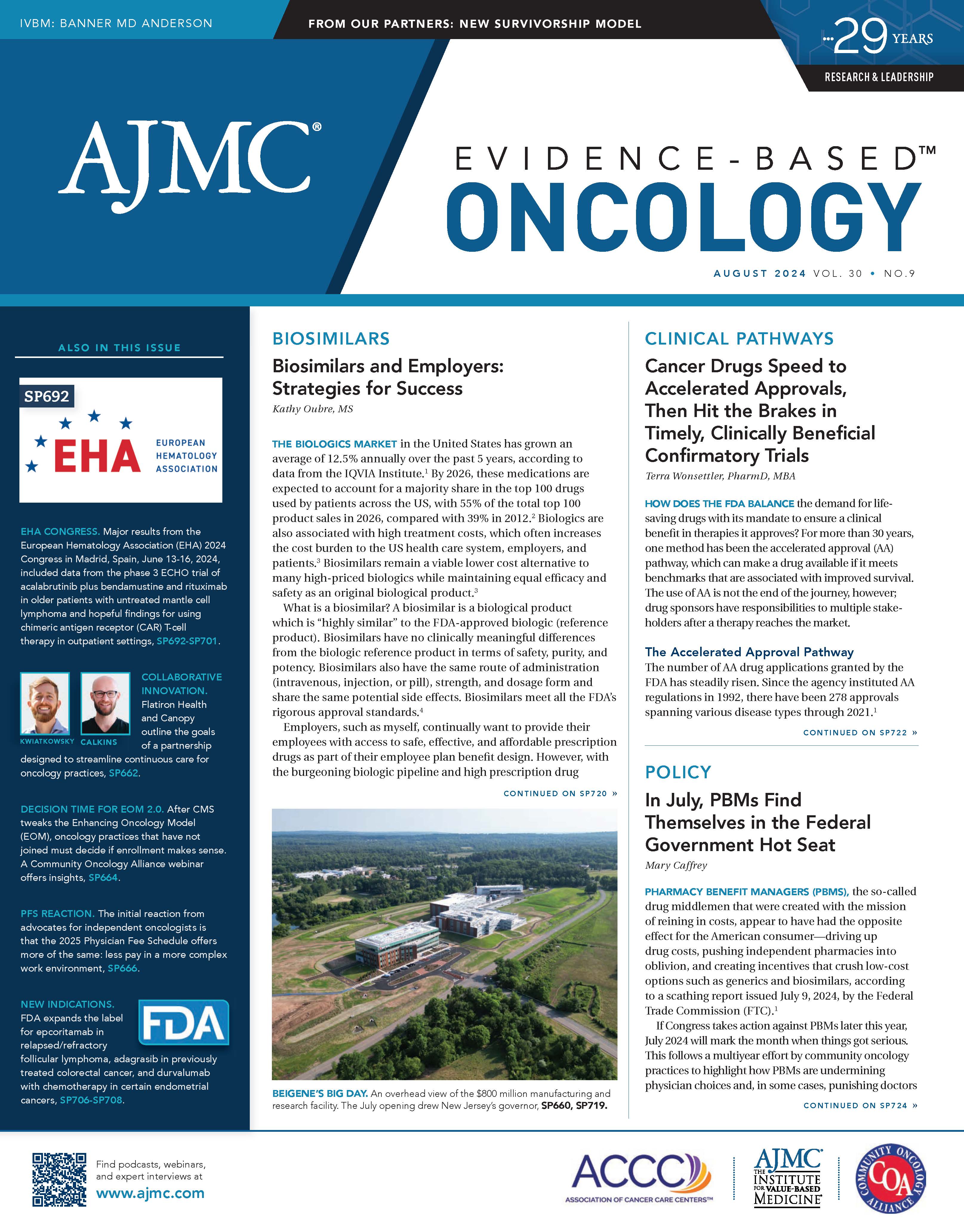- Center on Health Equity & Access
- Clinical
- Health Care Cost
- Health Care Delivery
- Insurance
- Policy
- Technology
- Value-Based Care
BeiGene’s Lanasa Highlights Tislelizumab Data, “Authentically Innovative” Pipeline
An interview with Mark Lanasa, MD, PhD, BeiGene senior vice president and chief medical officer for solid tumors, conducted at ASCO 2024.
During the 2024 American Society of Clinical Oncology (ASCO) Annual Meeting, Evidence-Based Oncology (EBO) spoke with Mark Lanasa, MD, PhD, BeiGene senior vice president and chief medical officer for solid tumors. Lanasa discussed findings presented at the meeting regarding tislelizumab, recently approved as Tevimbra in the United States as second-line monotherapy for unresectable or metastatic esophageal squamous cell carcinoma after prior systemic chemotherapy.1
Mark Lanasa, MD, PhD, senior vice president and chief medical officer for solid tumors, BeiGene | Image credit: BeiGene

Separately, Lanasa discussed BeiGene’s partnerships with Zymeworks and Jazz Pharmaceuticals for global development of zanidatamab, which is being studied in a variety of cancers with or without tislelizumab.2
This interview is edited for length and clarity.
EBO: Can you discuss major results being presented at ASCO 2024?
Lanasa: We are presenting a 3-year follow up from our study, RATIONALE-306 (NCT03783442). This study is in frontline, squamous histology esophageal carcinoma, which is a really terrible disease in terms of the prognosis. The patients who have advanced disease are not candidates for either surgery or radiation and have a very dismal prognosis. And they also have very difficult disease-related symptoms, given the anatomic location of the tumor, such as pain and weight loss.
We ran a relatively straightforward phase 3 study where it was standard-of-care chemotherapy with or without tislelizumab, which is our PD-1 inhibitor. This was a global study that enrolled over 600 patients, and in the primary analysis of the dataset,3 we showed a very strong response in terms of the primary end point of overall survival, which we think is the most impactful end point in this disease area. There was almost a 7-month improvement in overall survival, from roughly 10 months to roughly 17 months. That’s the largest incremental improvement that was achieved with a PD-1 inhibitor. We were very excited about those results, and we wanted to share updated survival follow-up to show the durability of the benefit. And indeed, overall survival as well as the secondary end points—progression-free survival and objective response rate—were sustained through a period of follow-up.
EBO: With these new data, what are the next steps?
Lanasa: That dataset has already been approved in China. And we have submitted that dataset in the United States for approval in the first-line setting as well as in Europe and in other markets, given the strength of the overall survival data and the fact that it was a globally conducted research clinical trial. We have a PDUFA [Prescription Drug User Fee Act] date for our submission in July of this year; however, as we disclosed in our earnings,4 the new action date may or may not be met because there’s some uncertainty in terms of FDA’s ability to travel to perform on-site inspections.
EBO: Earlier this year, BeiGene presented positive results for a tislelizumab combination in biliary tract cancer5; gastrointestinal (GI) cancers have seen considerable activity in recent years. What’s happening in this area?
Lanasa: As a broad statement, I am hopeful that for some of these tumor types that have been difficult to treat, we—meaning investigators and sponsors—will have opportunities to move the field forward as we identify better targets. Within biliary duct cancers, specifically those outside the liver and gallbladder, a relatively high proportion of these cancers, [compared with] other tumor types such as breast or gastric cancers, have an amplification of the HER2 gene. And despite the fact that this has been known, there are no approved therapies for HER2-overexpressing or -amplifying biliary disorders.
In collaboration with Zymeworks, and now Jazz Pharmaceuticals, we have executed a single-arm study in later-lying, overexpressing biliary tumors with a drug called zanidatamab. This is a HER2 x HER2 targeting bispecific, so both ends of the bispecific are targeting HER2, but they find different epitopes or have different binding sites on HER2. This is called a biparatopic design. The effect of having these 2 different binding sites is that it’s cross-linking, so [it can] grab 1 HER2 molecule on the cell surface, then grab another HER2 molecule on the cell surface. That has 2 effects: First, it internalizes very effectively, and second, that cross-linking also activates antibody-dependent cellular cytotoxicity or ADCC.
There have been studies looking at a combination of pertuzumab and trastuzumab, which are monoclonal antibodies targeting HER2, and the response rate is teens. But what we saw in the zanidatamab second-line study is that the response rate was slightly over 40%. So these are really strong datasets. And, importantly, the duration was almost a year6 when anticipated survival is much less than a year in second-line cholangiocarcinoma. That is a really great step forward.
Jazz and Zymeworks [have] announced that FDA has granted priority review on that submission in the United States.7 This is a regional alliance where we have rights in China, South Korea, and Australia; Zymeworks and now Jazz have rights in their regions. We also intend to submit those datasets for regulatory approvals in our region. The confirmatory study that has been discussed [will be] a frontline study of the combination of zanidatamab plus PD-1 or a PD-L1 inhibitor [along with] chemotherapy in HER2-overexpressing biliary tumors, to hopefully move that benefit in a later-line setting into the frontline setting when [patients] generally would have a better performance status.
EBO: You are in a number of disease areas that are highly competitive.
Lanasa: That’s by design. Our mission really has 2 parts. Our mission is focused on innovation, that we’re not simply a “me, too” company. I want to be clear about that when we’re talking about our PD-1, because I know there are 7 or 8 approved PD-1s in the United States. There are over 20 approved in China. Our PD-1 was designed to be different. We have an important piece related to innovation, but then we have an equally important piece related to global patient access. The reality, even though that might not be readily apparent here in the United States, is that there are still regions in the world where PD-1s are approved, but there’s not effective market access. We’re committed to addressing both of those problems. And that’s why we think these datasets are important.
Part of the reason why we’re being ambitious is that there is unmet need around the world. Patients do not have access to PD-1 despite the substantial benefit that immunotherapy has brought patients in the tumor types of GI tract, lung cancer, and other tumor types. And the other reason is that we have a very large early portfolio. We see tislelizumab as our foundational molecule that we want to build best-in-class combinations on.
We have 3 areas of focus this year. The first is to take the positive phase 3 studies for tislelizumab and hopefully turn those into global regulatory approvals to achieve our ambition of market access and making PD-1s more broadly available globally. The second is to take our early portfolio, particularly our early immuno-oncology portfolio, things like TIGIT [T cell immunoreceptor with immunoglobulin and ITIM domain], and our HPK1 molecule (which had results at ASCO8), and combine those with tislelizumab to have best-in-class combination regimens. And then the third area of focus is our innovative portfolio. We’re bringing 10 new molecules into the clinic this year. We have a diverse array of modalities and targets: There is a CDK4 selective inhibitor in breast cancer, a pan-KRAS inhibitor for GI and lung cancer; a PRMT5 inhibitor; and our first-in house [antibody-drug conjugates]. So there are lots of different things that are authentically innovative that offer exciting development opportunities to improve outcomes for patients.
References
- BeiGene receives FDA approval for Tevimbra for the treatment of advanced or metastatic esophageal squamous cell carcinoma after prior chemotherapy. News release. BeiGene. March 14, 2024. Accessed June 27, 2024. https://ir.beigene.com/news/beigene-receives-fda-approval-for-tevimbra-for-the-treatment-of-advanced-or-metastatic-esophageal-squamous/20eb032c-15ce-456a-a852-39c88a28d811/
- Clinical trials using zanidatamab. National Cancer Institute. Accessed June 27, 2024. https://www.cancer.gov/research/participate/clinical-trials/intervention/zanidatamab
- Yoon H, Kato K, Raymond E, et al. RATIONALE-306: Randomized, global, placebo-controlled, double-blind phase 3 study of tislelizumab plus chemotherapy versus chemotherapy as first-line treatment for advanced for metastatic esophageal squamous cell carcinoma (ESCC). Ann Oncol. 2022;33(suppl 4):S375. Abstract LBA-1. doi:10.1016/j.annonc.2022.04.439
- BeiGene reports first quarter 2024 financial results and business updates. BeiGene. May 8, 2024. Accessed June 27, 2024. https://ir.beigene.com/news/beigene-reports-first-quarter-2024-financial-results-and-business-updates/6ec745f5-d655-4a8a-8952-4719f4cda32b/
- Fan J, Zhou J, Shi G, et al. A single-arm, multi-center phase II study of tislelizumab combined with lenvatinib and GEMOX as conversion therapy in potentially resectable locally advanced biliary tract cancer (ZSAB-TransGOLP): a primary analysis. J Clin Oncol. 2024;42(3): suppl 448.
- Meric-Bernstam F, Beeram M, Hamilton E, et al. Zanidatamab, a novel bispecific antibody, for the treatment of locally advanced or metastatic HER2-expressing or HER2-amplified cancers: a phase 1, dose-escalation and expansion study. Lancet Oncol. 2022;23(12):P1558-P1570. doi:10.1016/S1470-2045(22)00621-0
- Zanidatamab granted priority review for HER2-positive metastatic biliary tract cancer. News release. Jazz Pharmaceuticals. May 29, 2024. Accessed June 27, 2024. https://investor.jazzpharma.com/news-releases/news-release-details/zanidatamab-granted-priority-review-her2-positive-metastatic
- Deva S, Zhou C, Bishnoi SK, et al. A first-in-human phase 1a dose-escalation study of BGB-15025 (HPK1 inhibitor) as monotherapy and in combination with tislelizumab (TIS; anti-PD-1 antibody) in patients (pts) with advanced solid tumors. J Clin Oncol. 2024;42(suppl 16): Abstr 2585. doi: 10.1200/JCO.2024.42.16_suppl.2585

The Importance of Examining and Preventing Atrial Fibrillation
August 29th 2023At this year’s American Society for Preventive Cardiology Congress on CVD Prevention, Emelia J. Benjamin, MD, ScM, delivered the Honorary Fellow Award Lecture, “The Imperative to Focus on the Prevention of Atrial Fibrillation,” as the recipient of this year’s Honorary Fellow of the American Society for Preventive Cardiology award.
Listen
Promoting Equity in Public Health: Policy, Investment, and Community Engagement Solutions
June 28th 2022On this episode of Managed Care Cast, we speak with Georges C. Benjamin, MD, executive director of the American Public Health Association, on the core takeaways of his keynote session at AHIP 2022 on public health policy and other solutions to promote equitable health and well-being.
Listen
